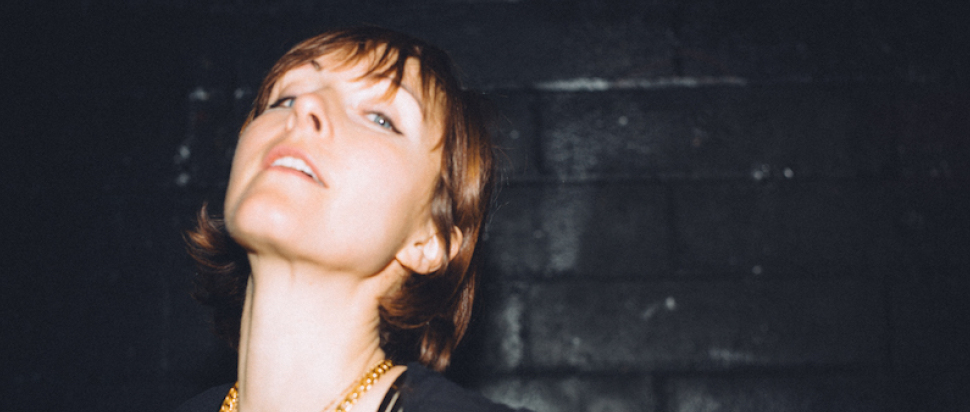Staying Alive: Poliça's Channy Leaneagh
Channy Leaneagh on how a near-death experience inspired Poliça's most recent album, When We Stay Alive
The sound of spoon upon mixing bowl and the occasional high-pitched “mommy” chimes in the background as we catch up with Poliça frontwoman Channy Leaneagh. “We’re making cinnamon buns,” she says. A blizzard swarms outside, and Leaneagh contemplates whether she’ll be able to get to band practice in the afternoon.
The weather that hits Minneapolis at this time of year is no plain-sailing, as Leaneagh can certainly vouch for. This time last year, the roof of her house was overcome with ice dams where layers of snow packed on top of the roof, leading to leakages into the house. Leaneagh explains that she has always been a fixer when it comes to housework, and when she came home from touring to find water coming in through her roof, she attempted to remove the dams herself. It was then that she suffered a serious fall off the two-storey roof, from which she was very nearly paralysed. It's this accident that forms the backdrop of When We Stay Alive, Poliça's fifth studio album.
The band’s increasing recognition over the past few years is unexpected, insists Leaneagh: “I had no ambitions of the band being a thing that went beyond Minneapolis.” She has always been torn between pursuing a career in music, and the underlying sense that she should be getting a “real job”. “Music has always been in my family,” she says. “My grandfather travelled through World War II with his violin and brought it home. But it’s always been seen as a hobby or a passion. It’s never been someone’s career. I always have this argument with myself: like, okay, I’m really grateful for this, but it’s not sustainable. I have this pragmatic side of me which tells me that it’s time to go get a job.”
It was perhaps this feeling that led Leaneagh and the rest of the band to take a break. “It’s only been two years [since our last record], but for us that’s really slow,” she explains. “The past eight years have just been touring, touring, record, record.” As the band took a break, Leaneagh returned to working as an assistant nurse, as well as in a pre-school and a Chinese medicine clinic. “I think we all just wanted to go back to the time when music didn’t have the pressure of being our full-time job. It put a level of pressure on it that took away from the fun and the magic for us.”
Strangely enough, while Leaneagh was mentally feeling the need for a break, she was forced to take one physically. “It’s an odd irony,” she muses. “When I fell, I suddenly had all this time where I had to lay in bed, and I couldn’t go to work. It slowed things down. I was able to take that time to be quiet, which is what I need to be creative.”
That said, the healing process wasn’t easy. “Even before I fell," she says, "I was in a really low place. It was the depths of winter and the work I was doing was difficult. I was feeling depressed, having recently come off the antidepressants that I’d been on for a lot of my life.” After falling, she says: “I felt the physical equivalent to the emotional pain I’d been feeling.”
After the accident, Leaneagh began seeing a chiropractor, who helped her to come to terms with it. “If you fall doing something dangerous, there’s this whole feeling of being an idiot,” Leaneagh explains, but her chiropractor encouraged her to take a new perspective. “I realised that the way to heal was to visualise that it happened differently to how it did, and to let go of the hang-ups I had about it,” she explains. “Previously, I had kind of trained myself to believe that you are defined by the things that happen to you, and the things you overcome. But I started to realise that it’s unhealthy to hold identity in the past.”
It was this change in mindset that started to feed into Leaneagh’s songwriting. “I started to take events and turn them on their heads so that I could write about them as if they happened in the way I wished they had,” she says. “I used to have a propensity towards a negative focus in my songs; a lot of my songs made the truth feel even worse than it was. I wanted to start writing songs where I’m visualising the past that I wanted to have, and the future that I want to have.”
When compared to the successes of her music, Leaneagh says her success in healing “feels safer; it’s something I can control. The unsettling thing about success in music is that it feels very unfair and luck-based. But with physical or emotional healing, it takes the same hard work and sacrifice, but you can physically feel the improvements. It’s not based on other people’s judgements; it’s more understandable and tangible.”
When We Stay Alive is released on 31 Jan via Transgressive Records; Poliça play Saint Luke's, Glasgow, 10 Feb
